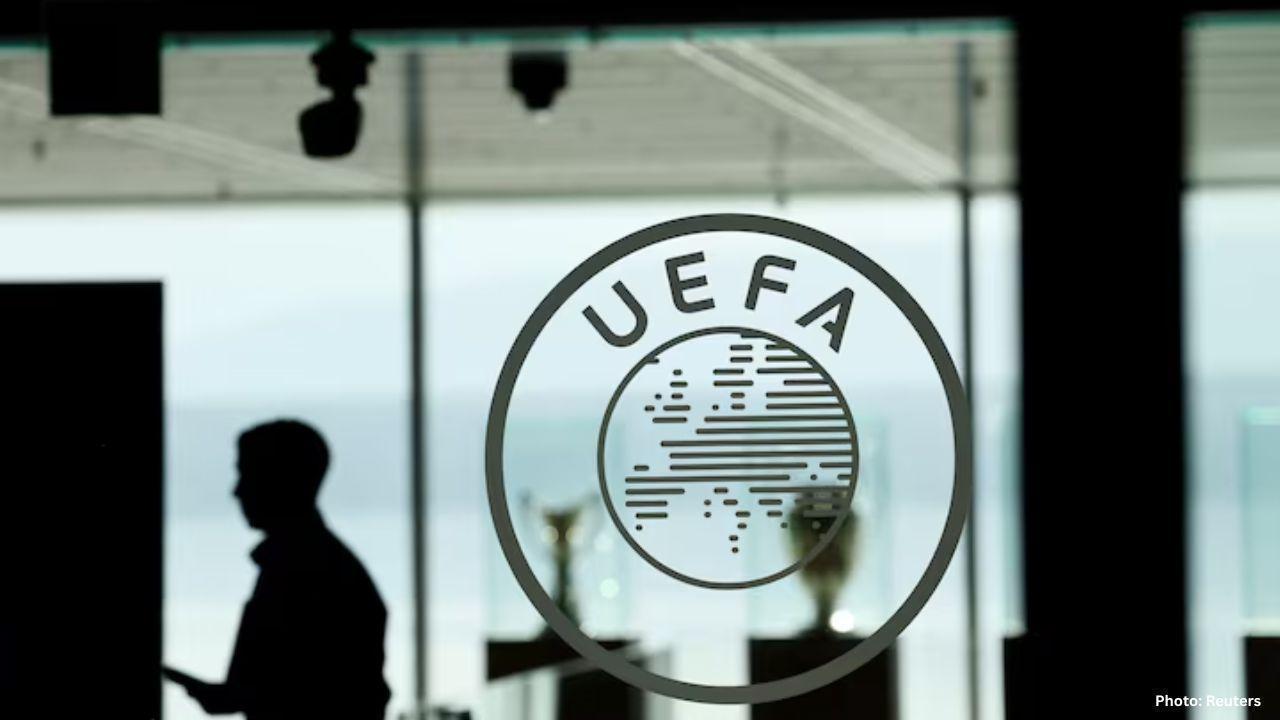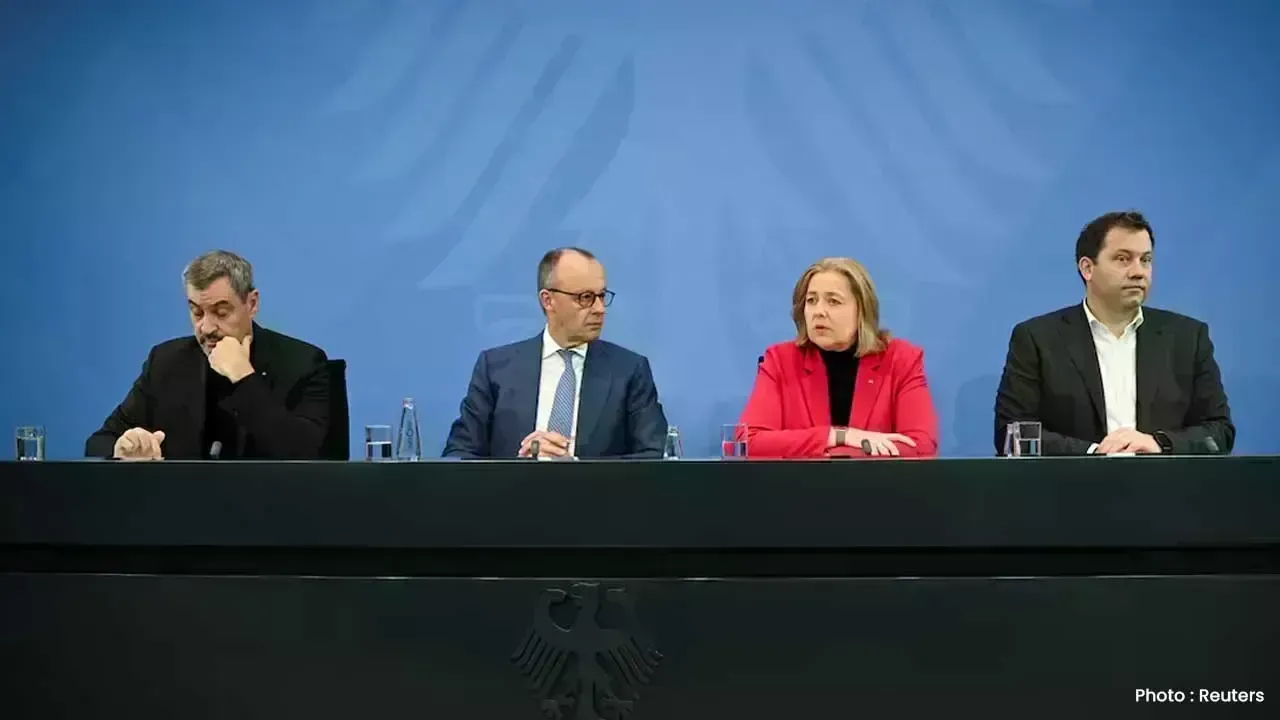
Post by : Monika
UEFA, the organization that manages football across Europe, has made a rare and unusual decision. It has allowed two major football clubs, AC Milan from Italy and Barcelona from Spain, to play some of their domestic league matches outside their home countries. Normally, UEFA expects league matches to be played in the home country of the clubs. This is to make sure fans have easy access, and the local atmosphere of football is maintained. But in these special cases, UEFA has agreed to make an exception.
Barcelona will play a La Liga match against Villarreal in Miami, United States. This will happen in late December. AC Milan, on the other hand, will play Serie A against Como in Perth, Australia, in early February. These matches will give fans in other countries a chance to watch European football live, which rarely happens for domestic league matches.
Why These Matches Are Being Played Abroad
There are clear reasons for both matches being played outside the clubs’ home countries. AC Milan’s stadium, the famous San Siro, will be unavailable at the time. The city of Milan and the stadium will be busy preparing for the opening ceremony of the Winter Olympics on February 6. Because of this, it is not possible for Milan to host their game in Italy.
For Barcelona, the decision to play in Miami is part of La Liga’s long-term plan to increase football’s popularity internationally. Spain’s La Liga has been looking for ways to reach fans around the world, inspired by American sports leagues such as the NFL and NBA. By playing games in other countries, they hope to introduce European football to new fans and increase their global audience.
UEFA’s Response
UEFA’s president, Aleksander Ceferin, spoke about the decision and made it clear that such approvals are rare. He said that domestic league matches should normally stay in the country where the clubs are based. He added that moving games abroad might make loyal local fans feel left out. Ceferin emphasized that this decision should not be considered as a change in the rules. UEFA wants to protect local leagues and ensure that football remains connected to the communities where clubs are based.
The organization also stressed that these matches are exceptional cases. They are not planning to regularly allow domestic games to be played abroad. The decision is only being made because of the unusual circumstances surrounding Milan’s stadium and because La Liga requested permission to play in the United States.
Reactions from Football Leagues and Clubs
The decision has received mixed reactions. Serie A, Italy’s top football league, welcomed UEFA’s approval. Ezio Simonelli, president of Serie A, said the move would help Italian football reach new fans and gain more international attention.
He explained that although local fans would not be able to attend the Milan-Como match easily, the global audience would benefit. He also acknowledged that traveling fans would face challenges because Perth is very far from Milan. The time difference would make watching the match live from Italy difficult.
Spain’s La Liga also welcomed the Miami match. La Liga believes this move could help attract more international fans and boost interest in Spanish football around the world. They also highlighted the potential financial benefits, as global audiences bring sponsorships, broadcasting deals, and other revenues that help strengthen clubs financially.
However, some clubs have expressed concerns. Real Madrid, another Spanish football club, opposed the idea of playing domestic games abroad. They believe moving games outside the home country could harm the competitive balance of the league. They said local fans might feel neglected, and the fairness of the competition could be affected. These clubs have urged UEFA and FIFA to carefully consider any similar requests in the future.
Impact on Fans
The decision to play league matches abroad has clear effects on fans. Milan and Como supporters will have difficulty attending the match in Australia because of the distance. Traveling to Perth from Italy is a long and expensive journey.
Local fans will miss the experience of cheering for their team at their home stadium. Similarly, Spanish fans who support Barcelona or Villarreal may find it hard to travel to Miami.
Despite this, UEFA and the clubs argue that international fans will have a rare chance to see top European football in their cities. This can help new football supporters experience the excitement of European football, which they usually cannot watch live. Clubs also hope this will build stronger connections with fans worldwide.
Tradition vs. Modern Opportunities
The decision highlights an important challenge in modern football: balancing tradition with growth and modern opportunities. European football has a long history of being connected to local communities. Fans feel a deep connection to their club and their stadium. Moving matches abroad could risk weakening this bond if done too often.
At the same time, football is becoming more global. Clubs want to grow their fan bases internationally, earn more money, and attract young supporters worldwide. Playing matches abroad is one way to achieve these goals. UEFA’s approach shows that they are trying to balance these two priorities: keeping domestic competitions strong while allowing exceptional international opportunities.
Financial and Global Implications
Playing matches abroad has financial benefits for clubs and leagues. International games increase broadcasting revenues because more people around the world can watch. Sponsors are also interested in international exposure. La Liga and Serie A clubs can benefit from these opportunities to grow their brand globally.
Additionally, international matches give players the experience of playing in different environments and facing global fans. This can help clubs improve their market value and reputation. On the other hand, clubs must also consider the logistics, costs, and travel challenges for players and staff. These factors are important when planning matches far from home.
UEFA’s Guidelines
UEFA has made it clear that this is an exception, not a rule. Domestic league matches should normally remain in the club’s home country. UEFA will continue to monitor these experiments to ensure they do not harm fans, leagues, or the integrity of competitions. They want to keep local fans engaged and ensure that clubs maintain strong community connections.
UEFA also stated that any future requests to play abroad will be judged carefully. The organization will consider the reasons for moving the match, the impact on local fans, and whether it strengthens or weakens the league. The goal is to maintain fairness and tradition while allowing exceptional opportunities.
The approval of AC Milan and Barcelona’s matches abroad is a landmark decision in European football. It shows the challenges of balancing traditional fan culture with the global growth of the sport. While local fans may face inconvenience, international fans will get a chance to watch European football live. Clubs and leagues also have the opportunity to expand their reach and increase revenue.
UEFA’s cautious approach reflects its goal to protect the integrity of domestic competitions while allowing rare exceptions. Both AC Milan and Barcelona will benefit from these matches, but they will remain exceptions. The future of European football will continue to balance tradition with global opportunities, keeping the sport strong at home while growing internationally.
This decision may be remembered as an important step in football’s global journey, showing that even traditional sports can adapt to modern trends. It highlights the importance of careful planning, respect for fans, and balancing old and new priorities. UEFA, clubs, and leagues will continue to face these challenges as football becomes an increasingly international sport.










OpenAI Highlights Growing Cybersecurity Threats from Emerging AI Technologies
OpenAI has raised alarms about the increasing cyber risks from its upcoming AI models, emphasizing s

Manchester City Triumphs 2-1 Against Real Madrid, Alonso Faces Increased Scrutiny
Manchester City secured a 2-1 victory over Real Madrid, raising concerns for coach Xabi Alonso amid

Cristiano Ronaldo Leads Al Nassr to 4-2 Victory Over Al Wahda in Friendly Face-Off
Ronaldo's goal helped Al Nassr secure a 4-2 friendly win over Al Wahda, boosting anticipation for th

Landon Donovan Challenges Australia Coach on World Cup Prospects
Landon Donovan counters Australia coach Tony Popovic’s optimism for the World Cup, expecting an earl

Mercedes-Benz Forms Landmark Partnership with WTA
Mercedes-Benz and the WTA unveil a significant partnership effective January 2026, with major invest

Abhishek Addresses Divorce Rumours Concerning His Family
Abhishek Bachchan confirms that daughter Aaradhya remains oblivious to divorce speculations, focusin